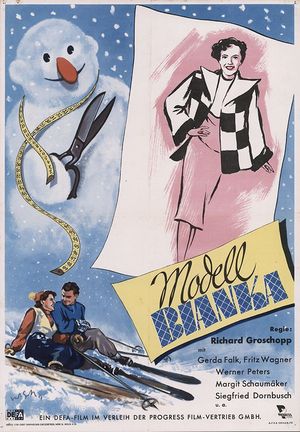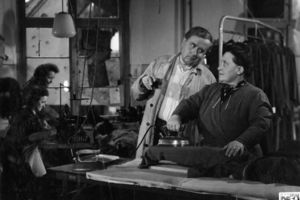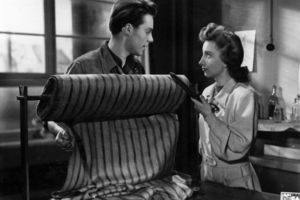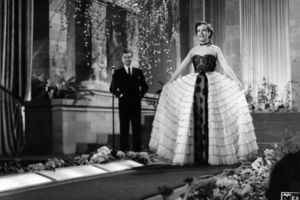Modell Bianka
Director: Richard Groschopp, 86 Min., Black-White, Feature Film
Deutsche Demokratische Republik (DDR)
DEFA-Studio für Spielfilme, 1951
- Film/Video Format
- 35 mm
- Length in m
- 2348
- Other Title
- Contra
- English Title
- Model: Bianka
- Premiere Date
- Release Date (for Cinema)

(Dir.: Richard Groschopp, 1951) Graphic Design: Kurt Geffers
Short Summary (English)
The friends Jochen and Gerd both work at the fashion boutique "Saxonia", which has only recently designed a new collection. Therefore, Jochen and Gerd are shocked when they meet two young ladies during their well-deserved holiday who are already dressed in two of the new pieces. And as if that was not enough, they pass the creations off as their own, even though they are employed at the competing company "Berolina". Naturally, the two men refuse to let the matter rest, although they do not actually want to raise a quarrel with the pretty ladies. After some turbulent entanglements they become aware of the foolishness of their squabbling and, eventually, the four of them present the disputed designs as a co-production at the fashion fair in Leipzig.
(Quelle: filmportal)

(Dir.: Richard Groschopp, 1951) Photography: Heinz Czerwonski

(Dir.: Richard Groschopp, 1951) Photography: Heinz Czerwonski
Film Crew
- Director
-
- Richard Groschopp
- Script
-
- Erich Conradi
- Richard Groschopp
- Adolf Hannemann
- Camera
-
- Walter Roßkopf
- Film Editing
-
- Lieselotte Johl
- Cast
-
- Gerda Falk (Ursel Altmann, 1. Direktrice - Berolina)
- Fritz Wagner (Gerd Neumann, Verkaufsstellenleiter - Saxonia)
- Werner Peters (Hans Obermann, Maschinenmeister - Berolina)
- Margit Schaumäker (Hilde Meißner, 1. Schneiderin - Berolina)
- Siegfried Dornbusch (Jochen Rauhut, Modellzeichner - Saxonia)
- Karl Hellmer (Emil Klein, Zuschneider - Saxonia)
- Herbert Kiper (Vater Krause, Transportarbeiter - Berolina)
- Trude Lehmann (Mutter Krause, Abbüglerin - Berolina)
- Edith Hancke (Inge Lang, Jungarbeiterin in der Zuschneiderei - Saxonia)
- Hans Neie (Fritz Große, Jungarbeiter in der Zuschneiderei - Saxonia)
- Friedel Nowack (Eva Schulze, Betriebsleiterin - Berolina)
- Josef Peter (auch: J. P.) Dornseif (Johannes Müller, Betriebsleiter - Saxonia)
- Albert Venohr
- Manfred Lehmann
- Ursula Ihlau
- Thea Achenwall
- Elfie Dugal (geb. Dugall)
- Carola Braunbock
- Gertraude Acker-Thies
- Gerhard Müller-Förtsch
- Assistant Director
-
- Rita Arendt
- Production Design
-
- Wilhelm Vorwerg
- Alfred Schulz
- Script Editing
- Music
-
- Horst Hanns Sieber
- Sound
-
- Albert Kuhnle
- Erich Schmidt
- Costume Design
-
- Gerhard Kaddatz
- Make-Up
-
- Martin Gericke
- Friedrich (auch: Fritz) Havenstein
- Marian Babiuch
- Production Management
-
- Adolf Hannemann
- Unit Production Management
-
- Toni Chudzinski
- Rudi Guth
- Werner Lüdde
- DEFA Photography
-
- Heinz Czerwonski
Short Summary (German)
Der Streit um ein Kleidermodell trübt die Urlaubsstimmung von Jochen und Gerd. Dabei könnte es so nett sein, denn die beiden unrechtmäßigen "Trägerinnen" des Modells, Ursel und Hilde, gefallen ihnen. Sie gehören zum Konkurrenz-Unternehmen "Berolina", während die jungen Männer, von denen die Modelle stammen, vom "Saxonia"-Werk sind. Wieder zu Hause, wird ihnen die Unsinnigkeit ihres Streits bewusst, und auf der Leipziger Messe findet die Versöhnung statt. Das Modell wird als Gemeinschaftsproduktion angekündigt, und zwei Paare machen eine Doppelhochzeit.
(Quelle: Das zweite Leben der Filmstadt Babelsberg. DEFA-Spielfilme 1946-1992)
Short Summary (Other Languages)
I litigi nati per colpa un nuovo modello di vestito rovinano le vacanze di Jochen e Gerd, quando invece potrebbero essere giorni così felici in compagnia delle due improprie "mannequin", Ursel e Hilde, che, peraltro, non sono affatto male. Entrambi lavorano per la "Berolina", azienda concorrente della "Saxonia", dove lavorano i due ragazzi. Di ritorno a casa, Jochen e Gerd riconoscono l'assurdità dei loro litigi. Faranno pace in occasione della fiera di Lipsia, dove il modello viene presentato come una creazione congiunta e le due coppie festeggiano un doppio matrimonio. (Italienisch)



